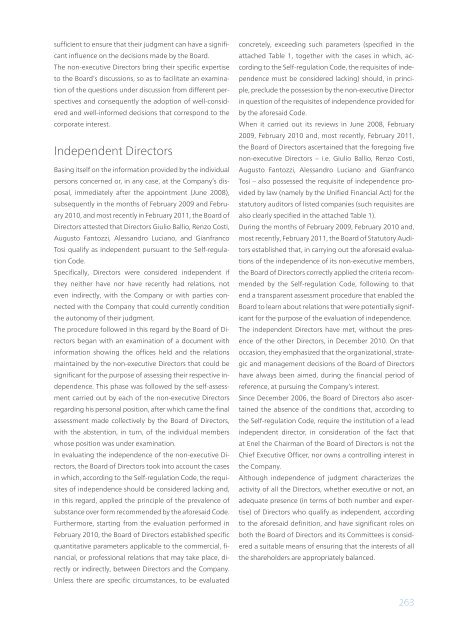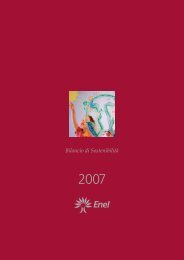Annual Report 2010 - Enel.com
Annual Report 2010 - Enel.com
Annual Report 2010 - Enel.com
Create successful ePaper yourself
Turn your PDF publications into a flip-book with our unique Google optimized e-Paper software.
sufficient to ensure that their judgment can have a significant<br />
influence on the decisions made by the Board.<br />
The non-executive Directors bring their specific expertise<br />
to the Board’s discussions, so as to facilitate an examination<br />
of the questions under discussion from different perspectives<br />
and consequently the adoption of well-considered<br />
and well-informed decisions that correspond to the<br />
corporate interest.<br />
Independent Directors<br />
Basing itself on the information provided by the individual<br />
persons concerned or, in any case, at the Company’s disposal,<br />
immediately after the appointment (June 2008),<br />
subsequently in the months of February 2009 and February<br />
<strong>2010</strong>, and most recently in February 2011, the Board of<br />
Directors attested that Directors Giulio Ballio, Renzo Costi,<br />
Augusto Fantozzi, Alessandro Luciano, and Gianfranco<br />
Tosi qualify as independent pursuant to the Self-regulation<br />
Code.<br />
Specifically, Directors were considered independent if<br />
they neither have nor have recently had relations, not<br />
even indirectly, with the Company or with parties connected<br />
with the Company that could currently condition<br />
the autonomy of their judgment.<br />
The procedure followed in this regard by the Board of Directors<br />
began with an examination of a document with<br />
information showing the offices held and the relations<br />
maintained by the non-executive Directors that could be<br />
significant for the purpose of assessing their respective independence.<br />
This phase was followed by the self-assessment<br />
carried out by each of the non-executive Directors<br />
regarding his personal position, after which came the final<br />
assessment made collectively by the Board of Directors,<br />
with the abstention, in turn, of the individual members<br />
whose position was under examination.<br />
In evaluating the independence of the non-executive Directors,<br />
the Board of Directors took into account the cases<br />
in which, according to the Self-regulation Code, the requisites<br />
of independence should be considered lacking and,<br />
in this regard, applied the principle of the prevalence of<br />
substance over form re<strong>com</strong>mended by the aforesaid Code.<br />
Furthermore, starting from the evaluation performed in<br />
February <strong>2010</strong>, the Board of Directors established specific<br />
quantitative parameters applicable to the <strong>com</strong>mercial, financial,<br />
or professional relations that may take place, directly<br />
or indirectly, between Directors and the Company.<br />
Unless there are specific circumstances, to be evaluated<br />
concretely, exceeding such parameters (specified in the<br />
attached Table 1, together with the cases in which, according<br />
to the Self-regulation Code, the requisites of independence<br />
must be considered lacking) should, in principle,<br />
preclude the possession by the non-executive Director<br />
in question of the requisites of independence provided for<br />
by the aforesaid Code.<br />
When it carried out its reviews in June 2008, February<br />
2009, February <strong>2010</strong> and, most recently, February 2011,<br />
the Board of Directors ascertained that the foregoing five<br />
non-executive Directors – i.e. Giulio Ballio, Renzo Costi,<br />
Augusto Fantozzi, Alessandro Luciano and Gianfranco<br />
Tosi – also possessed the requisite of independence provided<br />
by law (namely by the Unified Financial Act) for the<br />
statutory auditors of listed <strong>com</strong>panies (such requisites are<br />
also clearly specified in the attached Table 1).<br />
During the months of February 2009, February <strong>2010</strong> and,<br />
most recently, February 2011, the Board of Statutory Auditors<br />
established that, in carrying out the aforesaid evaluations<br />
of the independence of its non-executive members,<br />
the Board of Directors correctly applied the criteria re<strong>com</strong>mended<br />
by the Self-regulation Code, following to that<br />
end a transparent assessment procedure that enabled the<br />
Board to learn about relations that were potentially significant<br />
for the purpose of the evaluation of independence.<br />
The independent Directors have met, without the presence<br />
of the other Directors, in December <strong>2010</strong>. On that<br />
occasion, they emphasized that the organizational, strategic<br />
and management decisions of the Board of Directors<br />
have always been aimed, during the financial period of<br />
reference, at pursuing the Company’s interest.<br />
Since December 2006, the Board of Directors also ascertained<br />
the absence of the conditions that, according to<br />
the Self-regulation Code, require the institution of a lead<br />
independent director, in consideration of the fact that<br />
at <strong>Enel</strong> the Chairman of the Board of Directors is not the<br />
Chief Executive Officer, nor owns a controlling interest in<br />
the Company.<br />
Although independence of judgment characterizes the<br />
activity of all the Directors, whether executive or not, an<br />
adequate presence (in terms of both number and expertise)<br />
of Directors who qualify as independent, according<br />
to the aforesaid definition, and have significant roles on<br />
both the Board of Directors and its Committees is considered<br />
a suitable means of ensuring that the interests of all<br />
the shareholders are appropriately balanced.<br />
263









